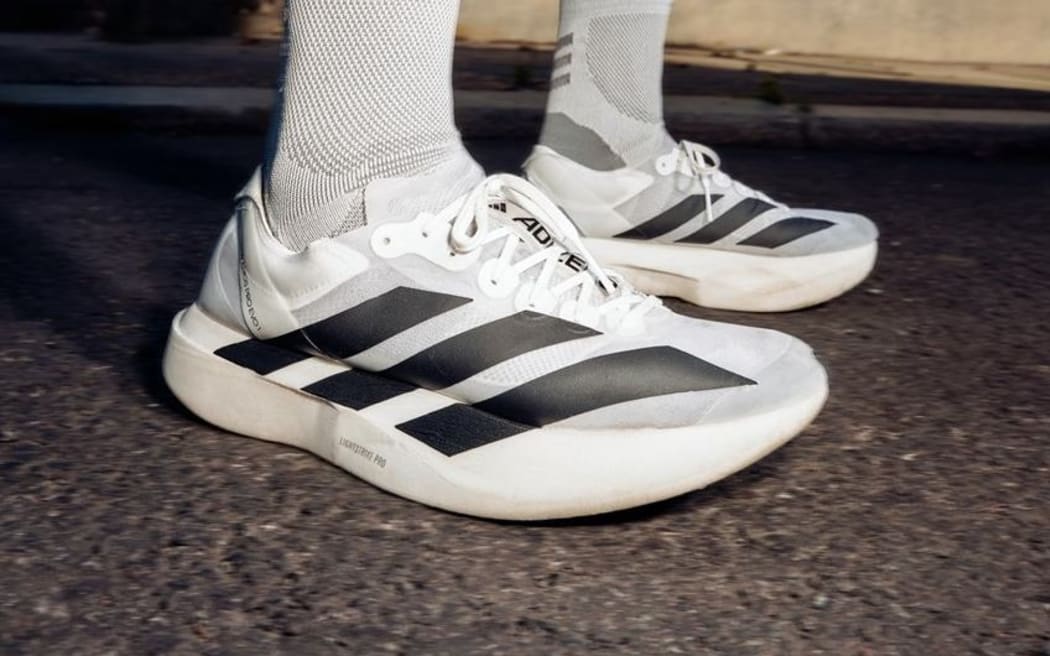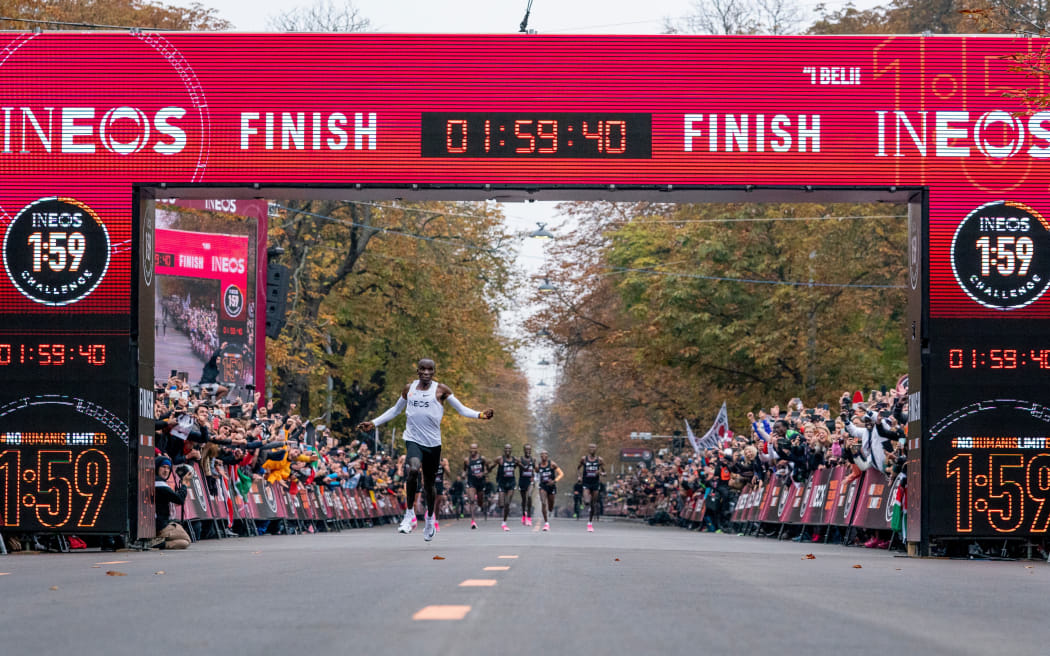Adidas enters sports arms race with running shoe that has stunning price tag

By Simon Smale ABC
Running’s technological arms race – or should that be legs race – has entered a new era with adidas’ extraordinary new shoe being hailed after the marathon world record was smashed in Berlin at the weekend.
Ethiopia’s Tigist Assefa took over 2 minutes off the previous mark by running a staggeringly fast official time of 2 hours 11 minutes and 53 seconds at the Berlin Marathon.
To put that into a more easily digestible number, Assefa would have completed your local parkrun in 15 minutes and 37 seconds – and then gone round the course seven and a bit more times at the same speed.
Sensationally, Assefa ran a negative split around the famous course, meaning her second half was faster than her first.
Of course, running at that pace doesn’t happen overnight – even if the 26-year-old former 800 metres runner is something of an overnight sensation having only run her first marathon in April last year.

Hours of training goes into being able to compete and race at that level, as Assefa attested after the race.
“I knew I wanted to go for the world record but I never thought I would do this time. It was the result of hard work,” Assefa said.
However, Assefa did have some help, a not-so-secret weapon she considered so important that she raised it high above her head after she crossed the line and kissed it.
No, this was not an effusive display of affection for her coach.
Assefa was wearing the latest super shoe, a generation of trainers that has already taken long distance running to new heights.
The vaguely Python-esque presentation of her new shoe, the adidas Adizero Adios Pro Evo 1, not only provided a hero shot a marketer could only dream of, but displayed how adidas has risen to the top of footwear’s latest frontier.
What are super shoes?

Adidas’ latest effort is far from the first super shoe to hit the market.
Eliud Kipchoge, who won the men’s race for the fifth time, was part of the first wave of new shoes seven years ago.
He wore a version of Nike’s Vaporfly when he broke the record and ran the world’s first sub-two-hour marathon under carefully controlled conditions in Vienna.
When Nike’s carbon-plated super-cushioned shoes first came onto the market in 2019, athletes wearing the shoes dominated, with runners claiming 31 of the 36 podium places in the six majors marathons that year.
Those kinds of statistics added credence to Nike’s claims that their technology improved running performances by as much as 4 per cent.
Australian marathon legend Rob de Castella described the new generation of shoes as “ludicrous” and called for them to be banned in 2020 but, other than restrictions being placed on shoes by World Athletics, the super-shoe era was not going anywhere.
Kipchoge, was wearing Nike’s latest version of its super shoe, the Alphafly, in Berlin.
He finished outside his world record but still ran the eighth fastest marathon of all time, a two-hour two-minute and 42-second effort after completing the first half of the course in a record-breaking pace of one hour and 22 seconds.
“I had some hiccups, but it is the nature of the race,” he said.
“I was expecting to break the record but it did not come. Every race is a learning lesson.”
If the general public has learned anything from the Berlin Marathon, it’s that adidas’ new shoe is the real deal.
Why are adidas’ shoes so special?
In adidas’ marketing spiel for the Adizero Adios Pro Evo 1 the company extols its “revolutionary” and “innovation-packed” shoe as being the lightest ever.
Weighing just 138 grams, the Adios is 40 per cent lighter than any other trainer adidas has on the market.
Adidas also spruiks it as having a built in, lab-tested “forefoot rocker”, essentially a ramp from almost heel to toe covering more than half the length of the shoe.
This sloping feature is said to “trigger forward momentum and improve running economy” according to the advertising speak.
The sole is 39mm thick at the back and 33mm deep at the front, within World Athletics’ limit of 40mm.
It seems the shoes can make a pretty impressive difference to the athletes as well.
“This is the lightest racing shoe I have ever worn,” Assefa said before the race.
“The feeling of running in them is an incredible experience – like nothing I’ve felt before.”
Although those comments were made before the race, Assefa’s stunning run clearly benefited from the new technology, running 2 minutes and 44 seconds faster than her time in the same race last year.
Huge price, short mileage
Development of this shoe took place at adidas’ development lab in Herzogenaurach, just outside Nuremberg in central Germany.
Athletes such as Peres Jepchirchir, Benson Kipruto, Amanal Petros and Assefa were also called upon to help develop the shoe.
With all that development comes a hefty price tag: $US500 ($NZ 840) for a pair.
For reference, Nike’s Alphafly retails at $400 in New Zealand from the official Nike store.
You’d expect a lot from a shoe that costs that much and, although the results certainly speak for themselves, you don’t get a whole lot of bang for your buck in terms of longevity.
In fact, these shoes are pretty much disposable.
In the box that contained any of the 521 pairs that were released earlier this month, there was a card which stated the shoe was designed for “one race – so one marathon – plus familiarisation time”.
The trainers have been made more widely available on September 14th.
Nevertheless, “this shoe is designed to help ambitious runners go even faster on race day,” according to Patrick Nava, the vice-president of Product, Running & Credibility Sports at adidas.
Whether developing a one-and-done running shoe does much for adidas’ environmental credibility remains to be seen – although one would expect the price tag would create a natural limit on piles of trainers being left on the roadside post-marathon.
ABC/RNZ
According to the news on Radio New Zealand




